Quince Paste (Dulce de Membrillo)
Quince Paste, also known as quince cheese or dulce de membrillo, is made from the pulp of quince fruit, which has been combined here with honey as the sweetener. This delicious confection provides the perfect balance of sweetness with a pear-like texture that will liven up any cheese board.
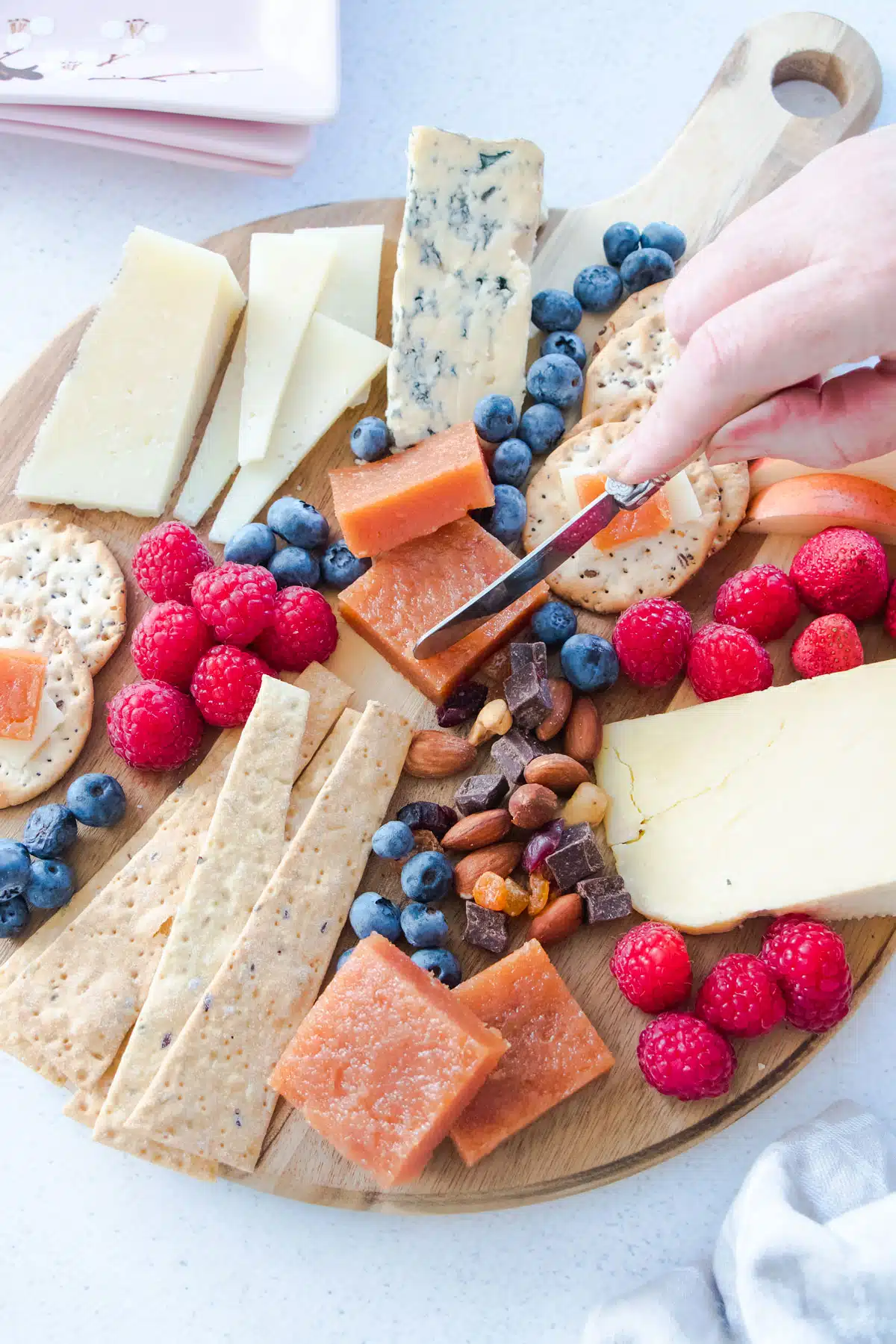
In This Article
Nutritional Benefits
Quince has been cultivated for centuries and has been used both as a food and medicine (1). It’s been used therapeutically for its antioxidant, anti-inflammatory, anti-allergic, and immune modulating effects in addition to being packed with vitamins, minerals, and fibre (2). Quince fruit is especially rich in phenolic compounds too that protect against the onset of many chronic diseases (2,3).
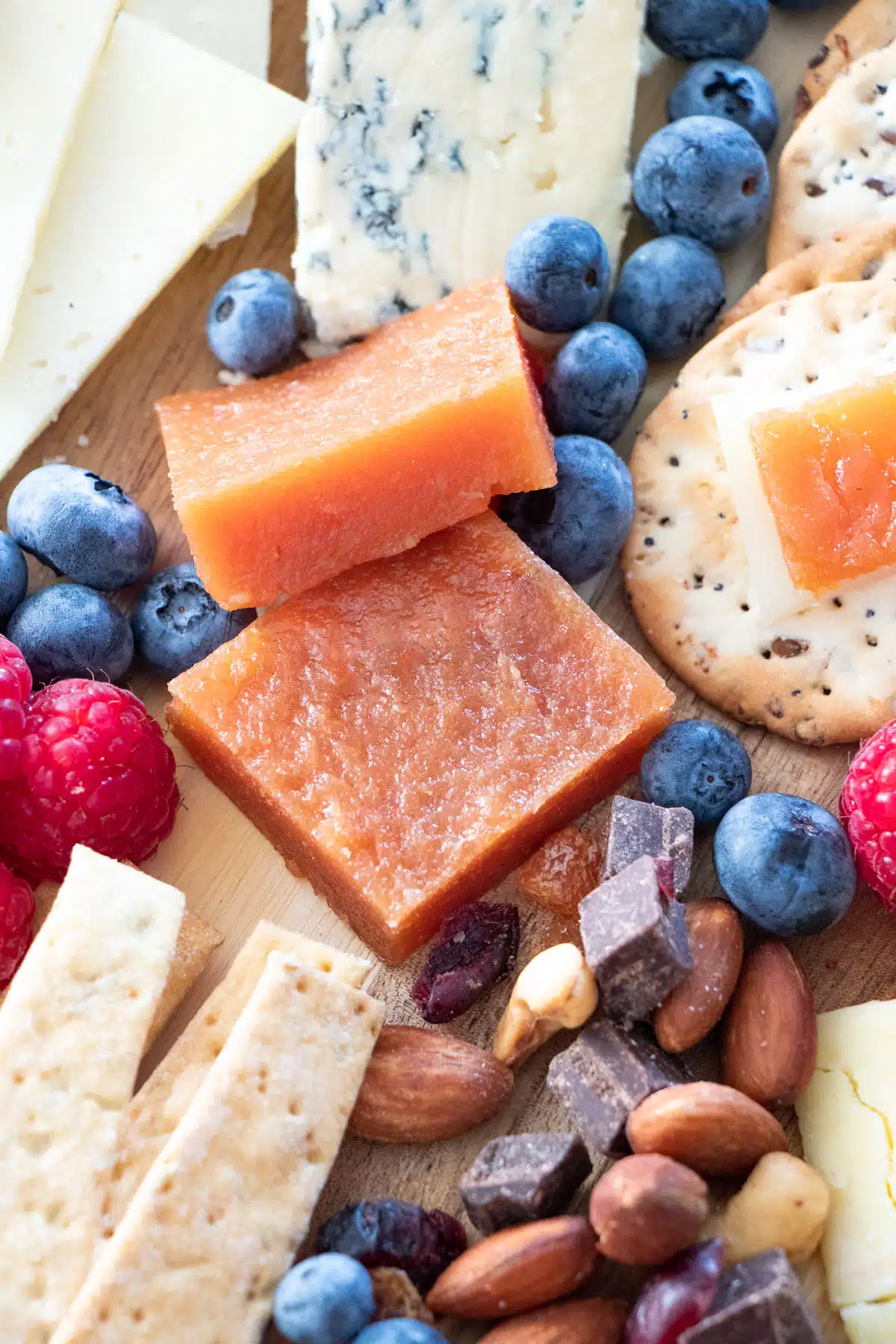
Ingredients – What You’ll Need To Make This Recipe
Only three basic ingredients are needed for a quince paste and all of them are easy to come by. If your local supermarket doesn’t have quince when autumn/fall rolls around, your local greengrocer will. Farmers markets are another great place to find them.
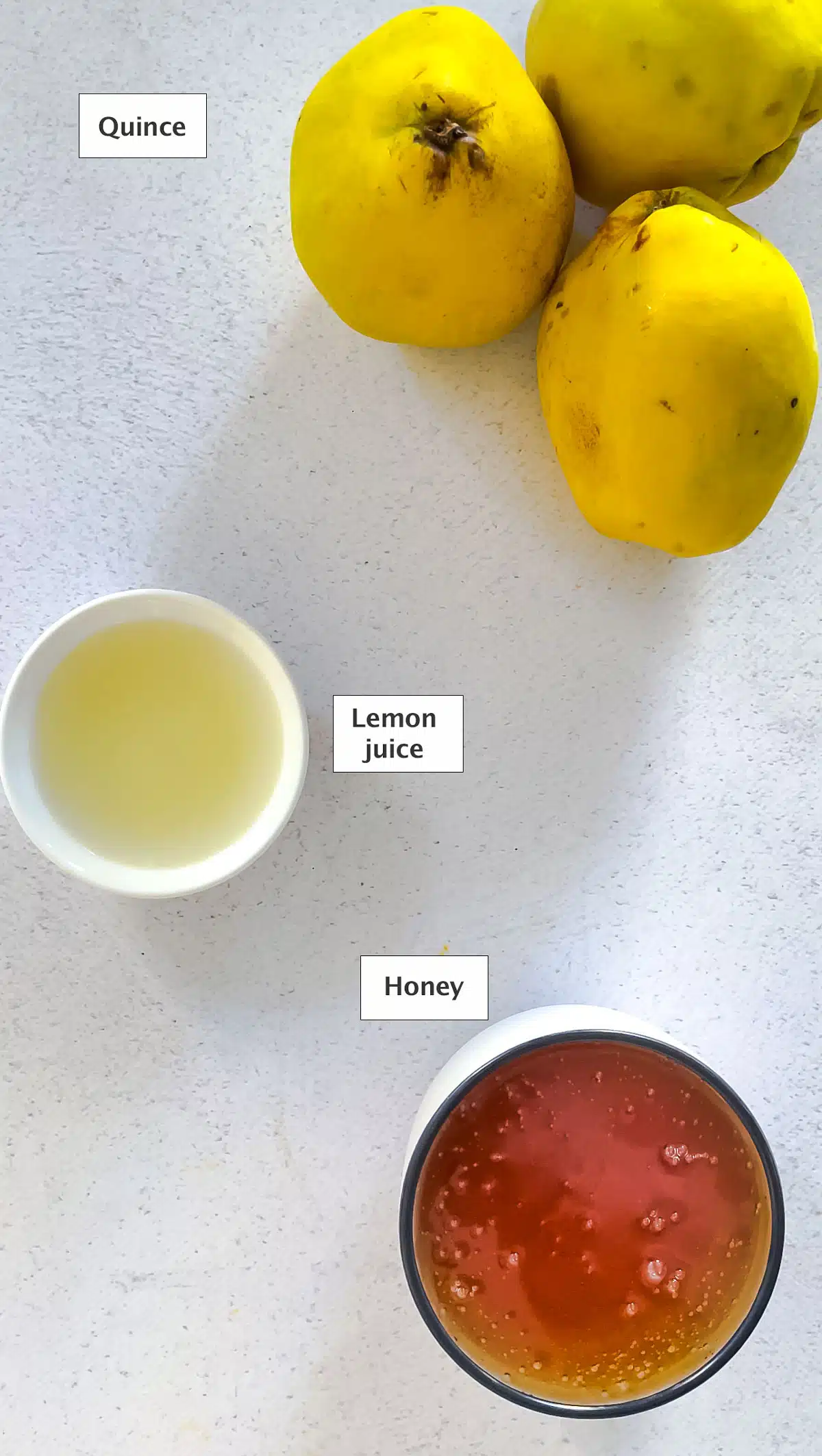
- Quince – A very tough, and quite tart fruit. It is perfectly suited to being cooked down and made into a paste like this.
- Honey – My preference over using sugar. It makes the quince paste especially luscious. It does contain more moisture than sugar though, so needs to be reduced for longer.
- Lemon juice – Adds some acidity, which helps to balance out the sweetness of the honey.
When quince is cooked it takes on a mildly pear-ish flavour and becomes quite sweet. It’s very high in pectin and as such it’s perfect for making jams, small confectionary bites or recipes like this quince paste. If it’s cooked right down, quince paste will become firm when chilled and it can be cut and added to cheeseboards. If reduced only partially, it remains softer and makes the most delicious filling for tarts.
How To Make Quince Paste
Making quince paste is not a difficult process however, it does take some time. The fruit needs to be boiled, then blended to a paste, which is further reduced so it thickens. This is a great project for a cold and rainy weekend.




- Peel, core, and chop quince into 2.5cm / 1-inch chunks. Place the quince into a large heavy-based saucepan full of water as you chop.
- Bring to the boil then reduce to a simmer. Leave to cook for about half an hour or until soft when pierced with a knife.
- Strain off the water then transfer the cooked quince to a blender and blend very briefly until a smooth paste forms.
- Measure out the amount of puree you have then pour it back into your pot. Now measure out ¾ of that amount in honey. Add that to the pot too, along with the lemon juice.
- Place the pot back over a low heat and leave the quince paste to reduce for 2 – 2.5 hours with the lid off. Stir frequently to ensure it doesn’t burn. It will eventually become more difficult to stir, and a wooden spoon will stand straight up in it without falling. The colour will also be a gorgeous shade of dark pink/salmon.
- Line a 15 x 15cm (~6.5 x 6.5 inch) square dish with baking paper, pour in the cooked quince puree, smooth it out and leave to set in the fridge for a couple of hours.
Quince paste will last for many months in the fridge. To store – chop it into squares – usually the size you want to serve on a cheese board – and store it in an airtight container in the fridge. It keeps best if you place a piece of baking paper between each layer, so they don’t stick.
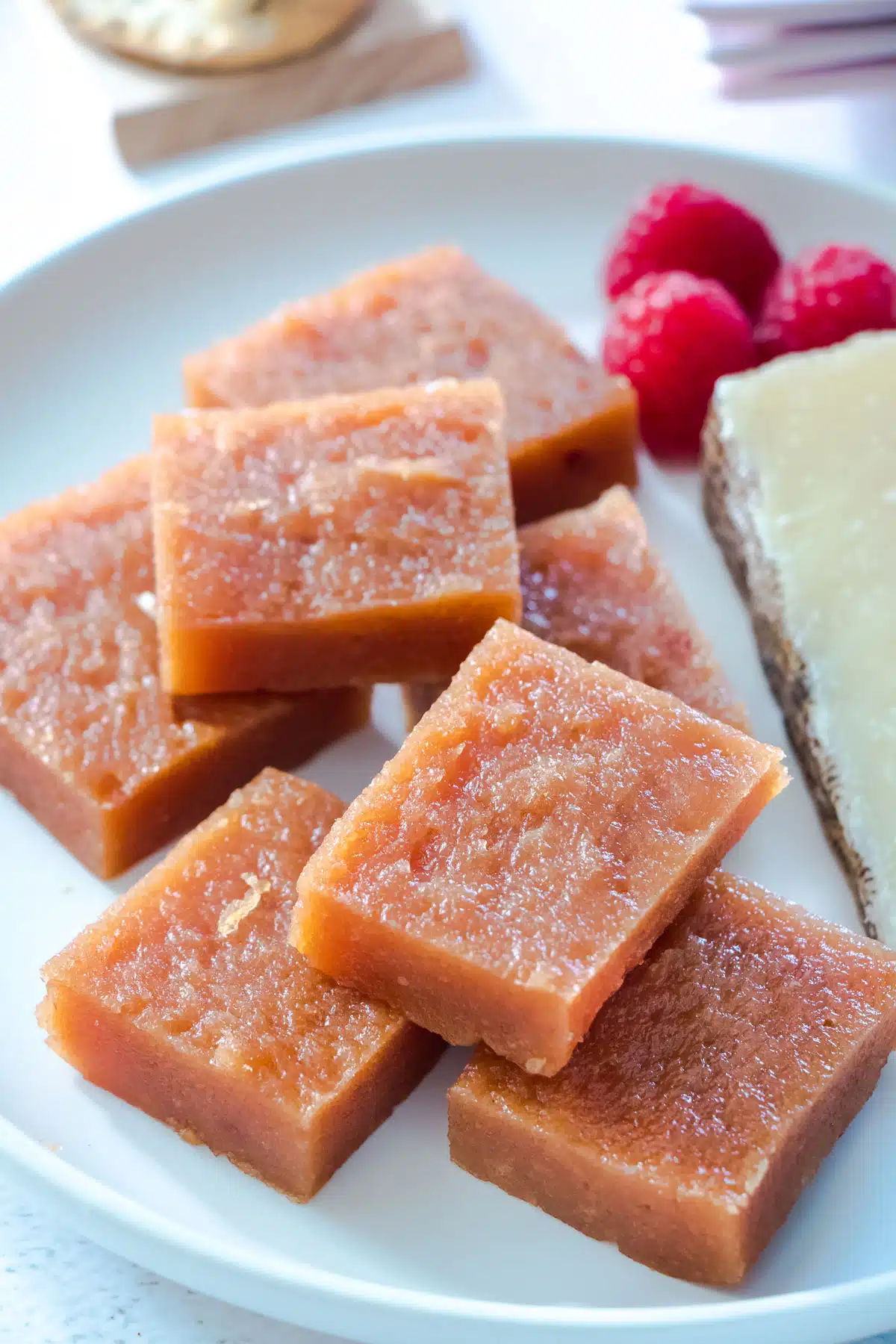
Substitutions And Variations
Sugar can replace the honey in this recipe if preferred. Where the honey only requires ¾ of the amount of quince paste, sugar should be 1:1. Once the quince has been boiled then pureed and measured out, measure out the same amount of sugar to add to the pot. Continue on with the rest of the recipe as is.
Tips For Success With This Recipe
I don’t recommend trying to reduce the amount of honey used. Over the course of several recipe tests I found that ¾ of the amount of quince puree in honey is what yields best results.
Sufficiently reducing the quince paste is the key to ensuring it will set. Look for three main things:
- The paste is harder to stir.
- The paste is a very dark pink, as per the image below.
- A wooden spoon can stand up in the mix completely unaided.
If all three of those things are ticked off the quince paste is ready to be taken off the heat.

Storing/Freezing/Make Ahead
Once the quince paste is set, it can either be cut it into pieces and stored in an airtight container with parchment paper between each square.
Or for something simpler – pour the quince paste into a glass dish that has a lid to set. You will still need to line this with baking/parchment paper. Once its set, leave it covered in the dish in the fridge and cut pieces as you need them. I recommend covering the top of the paste with a piece of cling/plastic wrap or a piece of baking paper before putting the lid on so it doesn’t crust over. It will store like this for many months.
FAQ
This is generally always due to the quince paste not being reduced enough. The deep pink colour of the paste and a wooden spoon standing up unaided should be your guides for when to remove it. More so than the timing in the recipe. If this does occur, it’s easy fixed. Simply scrape all the fruit paste back into the pot the next day and keep reducing it.
For a completely delicious snack serve this with cheese, cashew cheese, nuts or just nibble on it as is.
Any other fruit paste or fruit butter would work well here. Try my Apple and Honey Fruit Paste or Fig Butter if you’re after different flavours.
More Preserving Recipes
If you try this recipe, I’d love to know. Leave a comment, rate it, and remember to tag @wholenaturalkitchen in your pics or reels on Instagram, Facebook or TikTok!
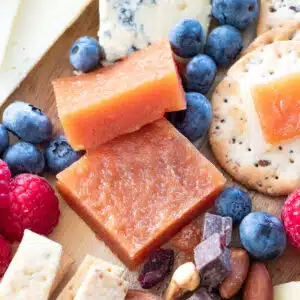
Quince Paste (dulce de membrillo)
Equipment
- Large heavy-based saucepan
- 15x15cm (~6.5 inch) Square dish
- Blender
- Baking/Parchment Paper
Ingredients
- 3 lb Quince (1.3kg)
- Honey (see note 1)
- 2 Tbsp lemon juice (roughly one small lemon)
Instructions
- Peel, core, and chop quince into 2.5cm / 1-inch chunks. Place the quince into a large heavy-based saucepan full of water as you chop.
- Bring to the boil then reduce to a simmer. Leave to cook for about 30 minutes or until the quince are soft when pierced with a knife.
- Strain off the water then transfer the cooked quince to a blender and blend briefly until a smooth paste forms.
- Measure out the amount of puree you have then pour it back into your pot. Now measure out ¾ of that amount in honey. Add that to the pot too, along with the lemon juice (see note 1).
- Place the pot back over a low heat and leave the quince paste to reduce for 2 – 2.5 hours with the lid off. Stir frequently to ensure it doesn't burn. It will eventually become more difficult to stir, and a wooden spoon will stand straight up in it without falling. The colour will also be a gorgeous shade of dark pink/salmon (see note 2).
- Line a 15 x 15cm (~6.5 x 6.5 inch) square dish with baking paper, pour in the cooked quince puree, smooth it out and leave to set in the fridge for a couple of hours.
- You can either store in an airtight container and cut pieces as you need them or cut into squares in advance then store in the container. It keeps best if you place a piece of baking paper between each square/slice, so they don't stick. It will store for many months.
Video
Notes
Nutrition
Pin This Recipe For Later
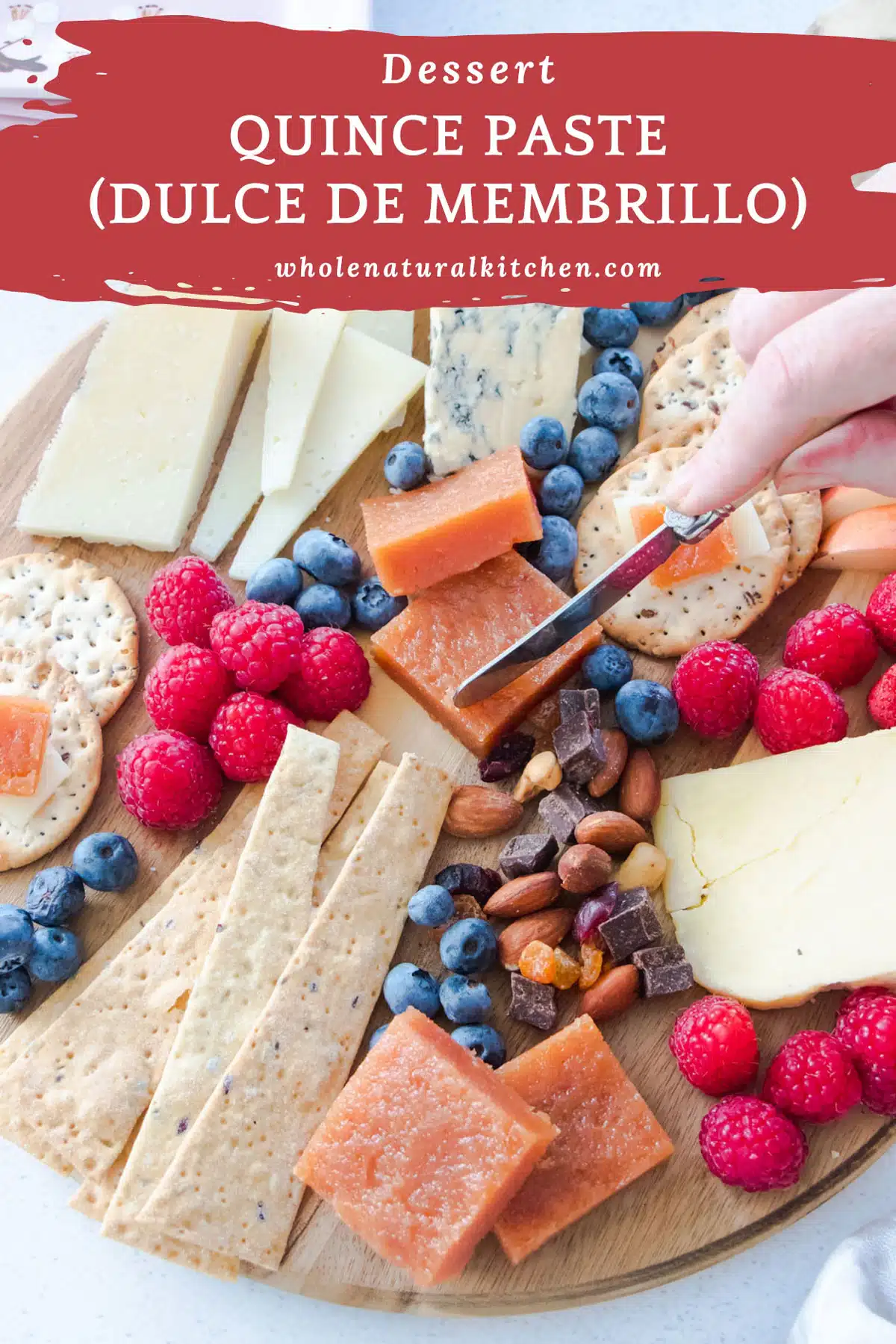

Gabby Campbell
Gabby is a degree qualified Naturopath/Nutritionist (BHSc Nat) with a love of all whole foods. She started her Naturopathic career in clinical practice before making the move to recipe development and online education – a result of wanting to combat the misinformation that abounds on the internet about food and health. Whole Natural Kitchen aims to transform the way you think about healthy eating by helping you embrace an abundance of nutritious foods while leaving the health fads behind. MORE ABOUT GABBY

Going to give this a try. My last effort with another recipe didn’t set and i followed it to the T. I ended up with something similar to an apple butter, which is still good. Placed it in 4 oz canning jars.
Looking forward to trying your recipe and perhaps transferring it to a slow cooker to prevent scorching. What do you think?
Antoinette
Cascade Head, Oregon, USA
Hi Antoinette – I must admit I haven’t tried this in a slow cooker but I’ll definitely give it a go when it’s quince season here again. I have had someone say something similar to me and my advice is that quince can really take some time to reduce. Much longer than other fruit in my experience. The best test of doneness for me is scooping the quince paste into the centre of the pot and sticking your wooden spoon into it. If it stands up unaided the quince paste is ready for the fridge and should set as expected.
Hi..have tried to make, yet again, quince paste…it hasn’t set…I took off the heat due to it catching too much..can it be cooked again in the microwave or my slow cooker on high…Tis frustrating (NZ)
Hi Lyn
I’m so sorry this isn’t setting for you, that is frustrating! I’ve only had one other person say this to me and I can only think in these instances the quince hasn’t been cooked down long enough. Even so, I’m going to revise the recipe to suggest also adding in some lemon juice. That should make it easier to ensure the recipe sets for everyone. I haven’t had to do this previously but I don’t want anyone going to the trouble of making my recipe only to find it doesn’t work for them. I will test out 2 tablespoons of lemon juice in this once quince hit the shelves here (about 1 – 2 weeks) and adjust the recipe accordingly. In the meantime I can’t say I’ve tried cooking in the microwave but I have seen others dry out their paste in the oven. Once it’s been poured into the prepared pan it goes into a 50C/125F oven for an hour. Hope that helps! And thanks for letting me know you were having issues with it. I will re-work ASAP.
This dessert looks very pretty! Perfect for celebrations. It looks yummy, too!
Thanks, Sharon.
I’ve never tried this before but looks so yummy! Can’t wait to make this and try it! Looks great and so delicious!
Thanks, Beth! I hope you enjoy it!
This was a new way to use quince for me. Just delicious.
It’s such a great way to use quince! Probably my favourite I think.
I’ve never made anything with quince, but this has inspired me to give this a try! Unique and unexpected; looks too good to pass up!
It’s a great thing to try if you haven’t cooked with quince before. Thanks, Sara!
This sounds amazing! I like quince, but have never made the paste, it looks so delicious.
Thanks, Biana! It’s really so very simple… it just takes a bit of time to stir every now and then so it’s a great recipe for the weekend.